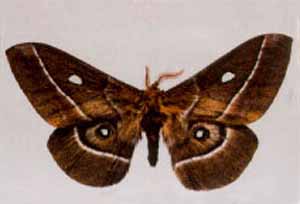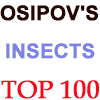Salassa olivacea
Salassa olivacea
Oberthur, 1890

Superfamily: Bombycoidea Latreille, 1802
Family: Saturniidae Boisduval, [1837] 1834
Subfamily: Salassinae Michener, 1949
Genus: Salassa Moore, 1859
Species: olivacea Oberthur, 1890 | |
MIDI MUSIC
"Moon River"
copyright C. Odenkirk
MIDI CITYON.OFF
<bgsound src="moon.mid" LOOP=FOREVER>
|
DISTRIBUTION:
Salassa olivacea (wingspan: 99-105mm) flies at high elevation (3100-3300m) in China
(Xizang, Sichuan, Yunnan) and possibly in countries bordering
those provinces to the south.

Salassa olivacea, Yunnan, China, 99m, BOLD Systems, on my home computer only.
The black am line is markedly concave in its upper third and then continues obliquely in a straight line to the inner margin.
Throughout its entire course it is inwardly lined with white.
The black pm line is quite convex in its upper half and is outwardly lined in prominent white through its entire course. This white is followed by a broad
burgundy subterminal band outwardly traced in a diffuse black line.
The ground colour for the basal, median and terminal areas is an even olive with a very generous suffusion of dark grey dots.
The forewing ocellus is large, suboval, tapering toward the outer margin.
FLIGHT TIMES AND PREFERRED FOOD PLANTS:
I believe there is an August-October flight, but am not certain.

Salassa olivacea, Sichuan, China,
105m, 3100m, August 15, 2006, BOLD Systems, on my home computer only.
ECLOSION, SCENTING AND MATING:
EGGS, LARVAE, COCOONS AND PUPAE:
Larvae are covered with
spine-bearing warts and spin loose cocoons near the ground amongst
loose debris.
Larval Food Plants
It is hoped that this alphabetical listing followed by the common
name of the foodplant will prove useful. The list is not exhaustive.
Experimenting with closely related foodplants is worthwhile.
Use your browser "Back" button to return to the previous page.
Return to Salassa genus
Goto Asian Pacific Saturniidae Directory
Goto Indo-Eastern European Saturniidae Directory
Goto Main Saturniidae Index

| 
Support this website and visit other insect sites by
clicking flashing butterfly links to left or right.
|

|
Use your browser "Back" button to return to the previous page.





